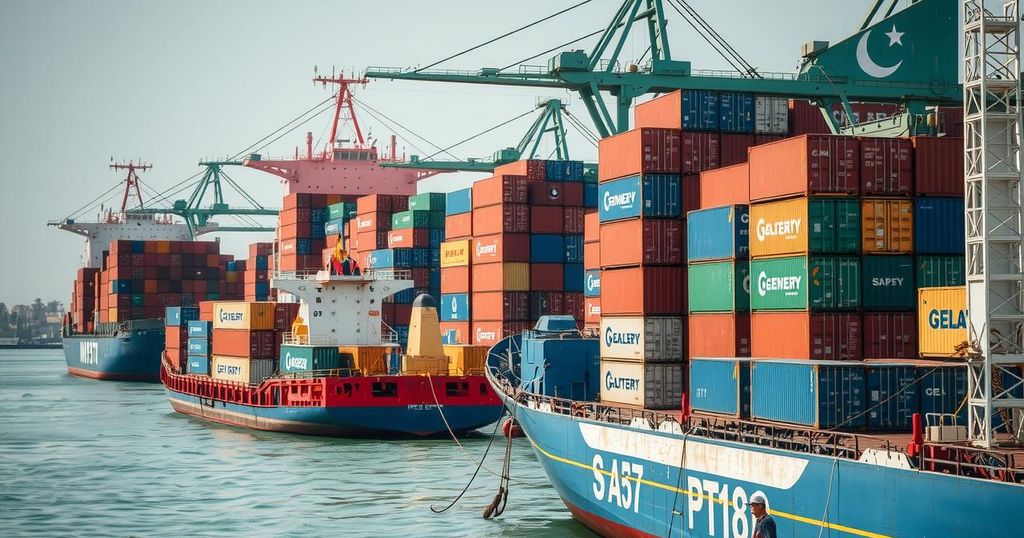Bangladesh and Pakistan Strengthen Trade Ties Amid Growing Maritime Links

Bangladesh and Pakistan are enhancing trade relations, marked by the arrival of the cargo vessel MV Yuan Xiang Fa Zhan in Chittagong. This marks significant maritime engagement, following a meeting between interim leader Muhammad Yunus and Prime Minister Shehbaz Sharif, both of whom agreed to strengthen bilateral ties and foster direct maritime connectivity. Their discussions highlight key historical issues and promote trade, culture, and sports collaboration.
The strengthening trade and maritime relations between Bangladesh and Pakistan have raised concerns in India, as evidenced by the recent arrival of the second cargo vessel from Karachi to Chittagong port. The MV Yuan Xiang Fa Zhan docked on a Sunday afternoon, carrying 811 containers of essential industrial goods, including soda ash, dolomite, and marble blocks, as well as garments raw materials, sugar, and electronic products. The vessel’s journey through Karachi and Dubai signifies a noteworthy development in bilateral trade.
This increment in maritime activities follows a significant meeting between Bangladesh’s interim leader, Professor Muhammad Yunus, and Pakistan’s Prime Minister Shehbaz Sharif in Cairo, where they discussed enhancing relations. Professor Yunus has taken a firm stance on improving diplomatic ties with Pakistan, diverging from the policy framework that characterized the previous administration, which favored India. One of the central initiatives under his interim leadership has been to establish direct maritime connectivity between the two nations, a historic gesture as this marks the first direct cargo exchange in over fifty years since Bangladesh’s independence.
The initial direct maritime shipment was facilitated by the Chinese cargo vessel MV Yuan Xian Fa Zhong, which successfully reached Chittagong from Karachi in November. Furthermore, in recent discussions, Mr. Yunus and Prime Minister Sharif reaffirmed their commitment to resolve pivotal issues stemming from Bangladesh’s tumultuous separation from Pakistan in 1971. Both leaders underscored the necessity of fostering deeper trade, cultural exchanges, and sports collaborations to strengthen their nations’ ties.
Overall, this growing partnership not only aims at enhancing economic integration but also reflects a shift in Bangladesh’s diplomatic approach under Professor Yunus. The acknowledgment of Pakistan as a “brotherly country” by Prime Minister Sharif signifies a mutual desire to reestablish connections that have been fragmented for decades.
The emergence of direct trade routes coupled with high-level dialogues between the two countries indicates a potential reorientation in South Asian diplomacy, which may also impact regional dynamics with India observing these developments closely.
The recent strengthening of trade and maritime ties between Bangladesh and Pakistan comes at a time of significant geopolitical shifts in South Asia. Historically, the two nations share a complicated past, having been part of the same entity until the 1971 civil war led to Bangladesh’s independence. The current interim leadership in Bangladesh under Professor Muhammad Yunus marks a shift towards potential rapprochement, contrasting with the pro-India policies of the previous government led by Sheikh Hasina. The establishment of direct shipping connections is a pivotal development in this context, aimed at reconstructing economic ties that have been dormant for decades.
In summary, the recent enhancement of maritime and trade relations between Bangladesh and Pakistan signifies a possible reconfiguration of diplomatic ties that have been strained since Bangladesh’s independence. With Professor Muhammad Yunus prioritizing engagement with Islamabad, and both nations expressing a shared commitment to strengthen bilateral ties, this development could reshape regional dynamics while posing challenges to India’s influence in the area. The successful arrival of vessels between the two countries represents not only economic opportunities but also a historical reconciliation effort after decades of separation.
Original Source: indiashippingnews.com








